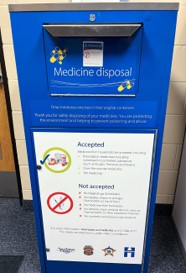
Lock It South Carolina is a suicide prevention initiative that aims to promote safe and responsible care of Lethal Means (including firearms and medications) and encourage community conversations about mental wellness. These are key components to preventing suicides.
Key Components
- Limiting access to lethal means for a person in crisis helps prevent suicide.
- Helping to educate personnel that take a gun lock on why it's important matters.
- Safe handling and secure storage of lethal means at home is encouraged.
- Proper disposal of unwanted medications and keeping medications away from children.
Having a conversation with a Veteran about firearm safety can be challenging. As someone who likely had some level of firearm training during their military service, the Veteran may not be receptive to talking about best practices for gun storage and security.
It can be helpful to frame your conversation around the safety of others-- family, friends, or children who may not know how to properly handle a firearm or understand its dangers, which could result in accidental injury or death
Nearly half of all Veterans own a firearm, and most Veteran firearm owners are dedicated to firearm safety. This can be attributed to the firearm training that they learned during their military service. Safe firearm storage practices can save a life by increasing the amount of time and space between the suicidal impulse and access to a firearm.
There are times when taking additional steps to ensure firearm safety is particularly important. Take extra precautions when someone you’re concerned about is:
- Increasingly isolated
- Violent
- Stressed
- Depressed
- Experiencing an emotional crisis or displaying significant behavioral change
- Anyone experiencing a traumatic event/life crisis
- Under the influence of drugs or alcohol or increasing the use of alcohol or drugs
- Recently discharged from a psychiatric facility
*At a minimum, all firearms should be stored, unloaded, and locked in a gun safe, cabinet, or storage case when not in use. Off-site storage may be advisable if there are concerns about the well-being of a Veteran or family members.
Nearly half of all Veterans own a firearm, and most Veteran firearm owners are dedicated to firearm safety. This can be attributed to the firearm training that they learned during their military service. Safe firearm storage practices can save a life by increasing the amount of time and space between the suicidal impulse and access to a firearm.
- Keep firearms unloaded and locked when not in use to prevent children and/or unauthorized adults from accessing them
- Store ammunition separately from firearms and out of the reach of children and unauthorized adults
- Request a gunlock from the SC Department of Veterans’ Affairs, your local County Veterans’ Affairs Office, police department, or your local U.S. Department of Veterans’ Affairs Suicide Prevention Program
- If a member of your family is going through a challenging time and is at increased risk of suicide, the safest option for any household firearms is to store them away from home until the person has recovered
*At a minimum, all firearms should be stored, unloaded, and locked in a gun safe, cabinet, or storage case when not in use. Off-site storage may be advisable if there are concerns about the well-being of a Veteran or family members.

Facts
- In the United States, someone dies by suicide every 11 minutes (SAMHSA New National Strategy for Suicide Prevention)
- In 2023, suicides by firearm comprised more than half (58%) of all suicide deaths in the United States (Center for Disease Control)
- On June 25, 2024, the U.S. Surgeon General Dr. Vivek Murthy issued a new advisory, declaring gun violence as a public health emergency (Health and Human Services (https://www.hhs.gov/sites/default/files/firearm-violence-advisory.pdf)
- Between 2012-2022, the rate of firearm-related suicide in the United States increased by 20% across the population, with the highest increases among younger people (age range from 10-65+ years old) (Fatal injury data from CDC Wonder)
- Firearms are the most frequently used method of suicide for Veterans and Servicemembers
- Firearms are the leading cause of death for American children and teens
- In 2022, Veterans were 1.5 times more likely to die by suicide than non-Veteran adults
- Veteran Suicide Rate in South Carolina is 34.3 per 100,000 (National average is 34.7 per 100,000)
Resources
- Community information on out-of-home storage of firearms (see Colorado Firearm Safety Coalition https://coloradofirearmsafetycoalition.org)
- American Foundation for Suicide Prevention and National Shooting Sports Foundation Suicide Prevention Toolkit (https://www.nssf.org/safety/suicide-prevention)
- Pause to Protect (https://pausetoprotect.org/resources/#rsrc-for-customers)

Prescription Safety
 Removal of unwanted medications can reduce the chance of taking them by accident and poisoning, especially for children
Removal of unwanted medications can reduce the chance of taking them by accident and poisoning, especially for children- Removing those unwanted medications also reduces the risk of taking the wrong drug by mistake
- Don’t flush medications down the toilet or in the trash
- Dispose of old, unused medication at a designated drop off center: Find One Near You
- Ask your pharmacist about the proper way to store your medications
Medication
 Store medication on higher shelves or in a locked medicine cabinet and away from the reach of children and pets
Store medication on higher shelves or in a locked medicine cabinet and away from the reach of children and pets- Store medicine in daily doses using bags or pill containers
- Don’t keep lethal doses of medications at home and/or only fill medication for the amount needed. Your doctor, pharmacist, or the poison control center may be able to help you determine safe quantities
- Be particularly aware of keeping prescription painkillers (e.g., Oxycodone) stored in a locked medicine cabinet due to their lethality and potential for abuse by children and unauthorized adults
- Visit the VA Center For Medication Safety (VA MedSAFE) for more information on safe storage and disposal of medications.